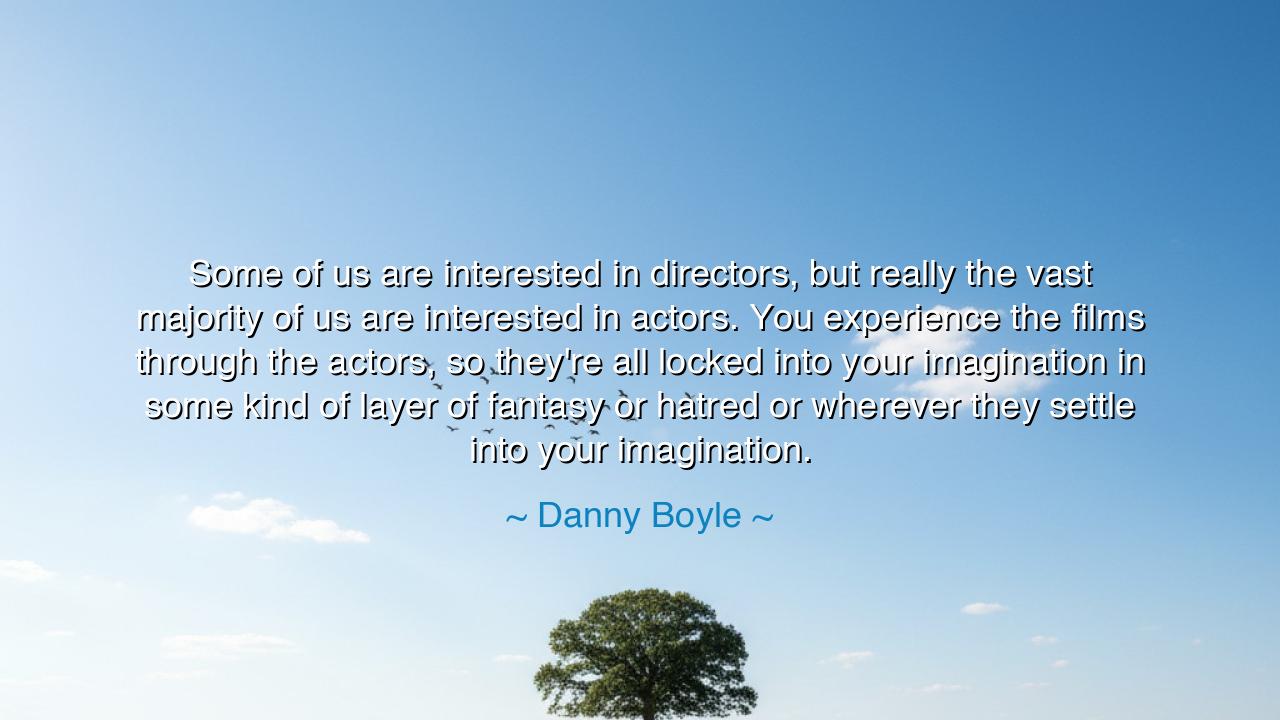
Some of us are interested in directors, but really the vast
Some of us are interested in directors, but really the vast majority of us are interested in actors. You experience the films through the actors, so they're all locked into your imagination in some kind of layer of fantasy or hatred or wherever they settle into your imagination.






"Some of us are interested in directors, but really the vast majority of us are interested in actors. You experience the films through the actors, so they're all locked into your imagination in some kind of layer of fantasy or hatred or wherever they settle into your imagination." These words from Danny Boyle touch upon a truth as old as storytelling itself—the power of the actor to shape the experience of a story. Boyle is not just speaking of a technical role in filmmaking, but of the sacred responsibility an actor bears in carrying the narrative of a film, making the audience live, breathe, and feel through the characters they portray. The director may guide the vision, but it is through the actor that we truly experience the world the film creates. They become, in a sense, the vessel of the story, and through their performance, we are transported into another world.
In ancient times, the Greeks understood this concept deeply. Their plays, especially the great tragedies of Sophocles, Aeschylus, and Euripides, relied not only on the strength of the script but on the actors who brought those words to life. The actor was the conduit through which the audience felt the full force of the characters’ fate, their joy, and their suffering. In the great amphitheaters of Athens, the audience did not merely watch a play; they experienced it. The actors’ voices, their gestures, their very presence on stage transformed the audience, allowing them to step into the world of gods and men. This imaginative experience was possible only because the actors infused their roles with the depth of human emotion, transforming mere words into something alive and palpable.
Consider the ancient actor Thespis, often credited as the first to introduce acting as a separate role in Greek theater, as opposed to the chorus merely chanting in unison. Thespis's decision to step forward and give voice to a character rather than simply speak the narrative forever changed the experience of theater. From that moment, the actor became a living, breathing embodiment of the story. Just as Boyle suggests, it is through the actor that the audience steps into the world of the play, allowing their imagination to roam freely. The actor became, in many ways, a mirror to the audience’s own inner world, reflecting their deepest fears, hopes, and dreams.
In more recent times, we can look to Marlon Brando, whose performance in A Streetcar Named Desire exemplifies Boyle’s assertion that the actor is the soul of the film. Brando’s portrayal of Stanley Kowalski is not merely an interpretation of a character—it is a raw, transformative experience. Brando’s ability to infuse the character with such intensity and vulnerability made Kowalski not just a figure in a script, but an experience for the audience. Through Brando’s eyes, his actions, and his voice, the audience could feel Stanley’s struggle, his anger, his desires, and his deep humanity. The story came alive because Brando’s performance unlocked the emotional core of the character, and through that, the audience experienced the film in a deeply personal way. Brando did not just play a role—he became the role, and the audience’s imagination was forever imprinted with the essence of his performance.
What Boyle speaks to is the very nature of film as a medium for emotional engagement. The actor allows the audience to step beyond the physical confines of the cinema, into the world of the story, and it is through the actor’s ability to evoke emotions that the film transcends mere entertainment. The actor is not a passive participant; they are the active bridge between the written word and the living experience. Boyle’s assertion is a reminder that storytelling—whether through theater, film, or any other medium—is an intimate exchange between the artist and the audience. It is not the mere telling of a story that moves us, but the embodiment of that story by an actor who breathes life into the script.
The lesson here is not just for those who create films or perform on stage; it is a reflection of the human condition itself. We are all actors in the play of life, and our actions, words, and presence influence the world around us in profound ways. Just as the actor shapes the experience of the audience, so too do we shape the world through our imagination and our ability to embody the roles we are given in life. Every action we take, every interaction we have, is part of the story of our existence, and we are the ones who bring it to life.
Thus, we must learn from Boyle’s wisdom: the power of the actor lies not in their ability to memorize lines, but in their ability to embody a character, to take the audience on a journey into a world of emotion, imagination, and truth. Like the great actors and creators of the past, we must allow ourselves to fully step into the roles we play, to engage deeply with the world around us, and to inspire others through the stories we live. Whether on the stage or in the everyday theater of life, we too are the ones who bring the world to life through our imagination. Let us act with purpose, with passion, and with the awareness that through us, the world’s stories—both our own and others’—are told.






AAdministratorAdministrator
Welcome, honored guests. Please leave a comment, we will respond soon